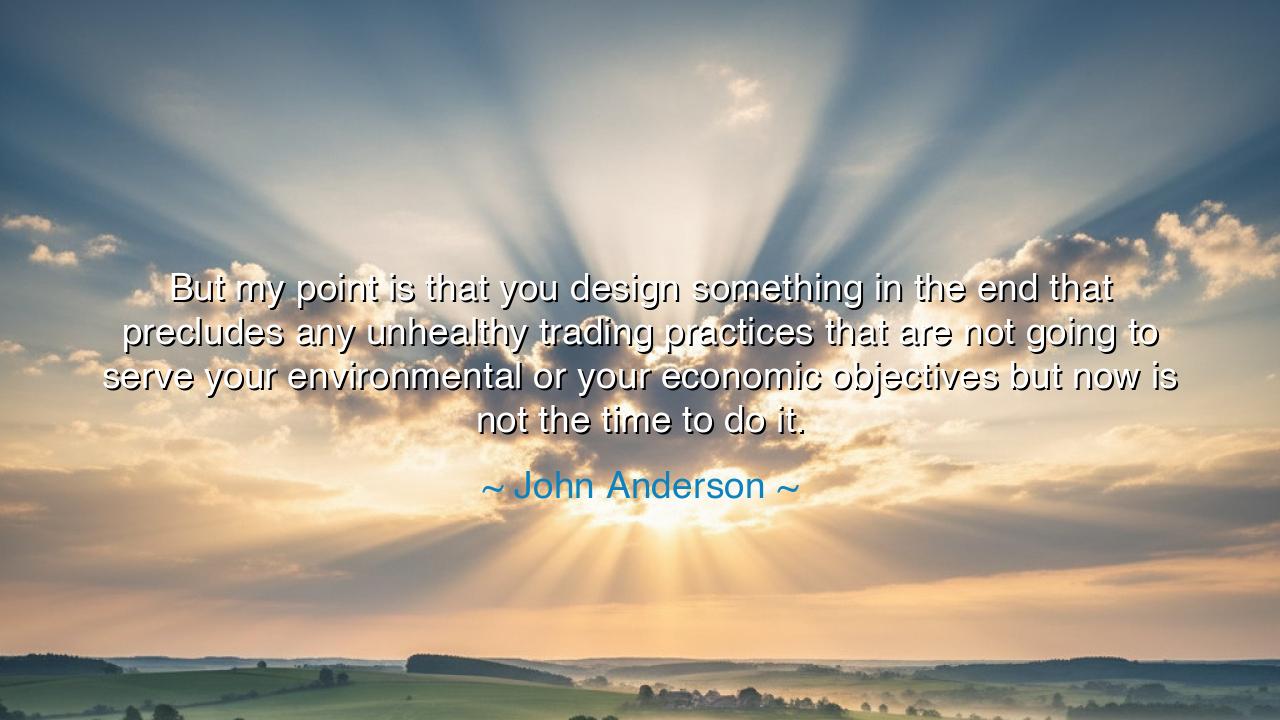
But my point is that you design something in the end that
But my point is that you design something in the end that precludes any unhealthy trading practices that are not going to serve your environmental or your economic objectives but now is not the time to do it.






“But my point is that you design something in the end that precludes any unhealthy trading practices that are not going to serve your environmental or economic objectives, but now is not the time to do it,” declared John Anderson, a voice of reason in a world often consumed by haste. His words, though born in the realm of policy and trade, reach far beyond their immediate context. They are a call to patience, to wisdom, to the understanding that designing for the good—whether in systems, societies, or souls—cannot be done in the fever of the moment. It is a warning as old as civilization itself: that what is built in panic will collapse in peace, and that true creation demands foresight and balance.
At its heart, this quote speaks of deliberate design—the art of crafting structures that prevent corruption before it begins. Anderson reminds us that wisdom does not lie merely in reacting to disorder, but in designing systems that sustain harmony. The “unhealthy trading practices” he names are not only economic perils, but symbols of moral decay—short-term greed that undermines long-term stability. His words echo through time as a reminder that every design—be it of a law, a city, or a life—must be built upon foundations that resist the erosion of corruption. For what good is prosperity if it poisons the land, and what use is progress if it consumes the future?
History offers us many examples of this truth. Consider the fall of ancient Rome, whose early laws were built upon discipline, equity, and duty. Yet as the empire grew rich, its trade became tainted by avarice, its markets by exploitation, and its politics by indulgence. Wealth poured in, but wisdom drained away. What was once a design for greatness became a machinery of decay. The Romans forgot what Anderson reminds us: that when systems are built without conscience, when commerce outruns morality, the splendor of the present purchases the ruin of tomorrow.
In his words we also hear a plea for timing and restraint. “Now is not the time to do it,” he warns—a phrase that carries the wisdom of patience, the understanding that even righteousness must wait for its season. The ancients knew this well. When the philosopher Solon reformed Athens, he did not seek to uproot the old in one swift motion, but to temper the new with respect for what already stood. For justice, like the planting of an orchard, must be done in due season. To force it too soon is to kill the seed; to delay it too long is to starve the soil.
Anderson’s words reveal the eternal tension between vision and prudence—the need to dream of a better order while respecting the slow rhythm of human change. To “design something in the end” implies not the absence of vision, but the mastery of it—the discipline to plan for a time when conditions are ripe, when the heart of the people and the structure of the world are ready to bear the weight of reform. True leadership, he teaches, is not the tyranny of immediacy, but the stewardship of endurance.
His emphasis on environmental and economic objectives reminds us that prosperity and preservation must walk hand in hand. For too long, humanity has chosen one at the expense of the other—wealth without care, or purity without progress. Anderson’s wisdom lies in the union of opposites: that good design must serve both earth and economy, that true progress uplifts both man and the world he inhabits. In this, his message becomes prophetic, echoing the old philosophies that saw nature and humanity not as rivals, but as partners in the grand design of existence.
Thus, the lesson of Anderson’s words is this: do not build in haste, and do not act without harmony. Before you design—whether it be a system, a policy, or a dream—ensure that it precludes harm, that it strengthens both the moral and the material, that it anticipates the vices that may one day seek to undo it. Be the architect who builds not for applause, but for endurance.
For in the end, the world remembers not those who rushed to act, but those who designed with wisdom. Like the master builders of old, let your works be firm against corruption, patient in construction, and noble in purpose. Then, when the time is right, what you create will stand—not as a monument to your ambition, but as a living testament to your understanding. For the wise know that the finest design is not born in haste, but in harmony with truth, time, and the greater good.






AAdministratorAdministrator
Welcome, honored guests. Please leave a comment, we will respond soon